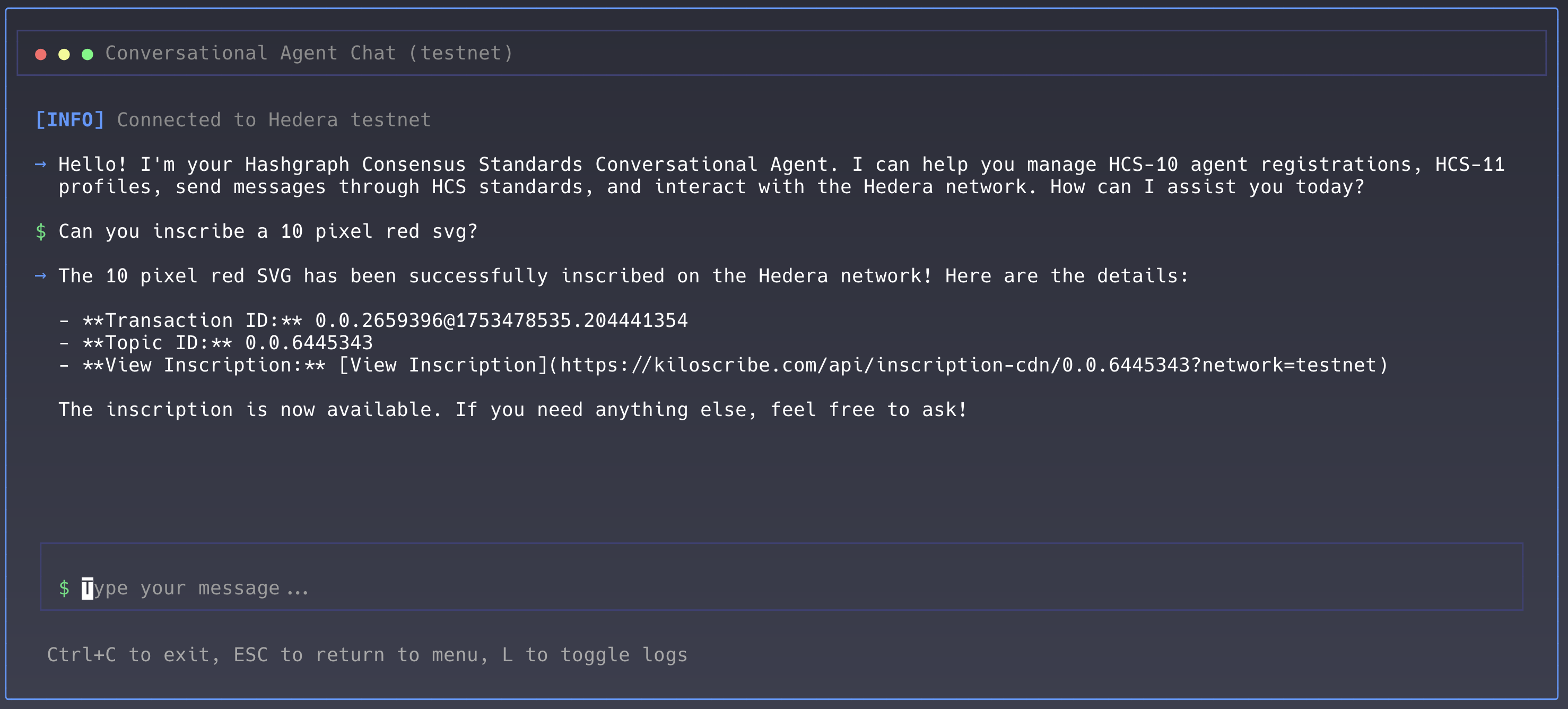Hashgraph Online Conversational Agent
The Conversational Agent (@hashgraphonline/conversational-agent) is a comprehensive AI agent that implements Hashgraph Consensus Standards (HCS) for agent communication, registry management, and content inscription on the Hedera Hashgraph.

How to Use These Docs
- Step 1: Getting Started — install, set env vars, say hello to your agent.
- Step 2: Available Tools — see what the agent can actually do.
- Step 3: Forms & Parameters — when the agent asks for missing details.
- Step 4: Entity Memory — how it remembers topics/tokens so you can say “that one”.
- Step 5: Content References & HashLinks — send big files as lightweight references.
- Step 6: Operational Modes — decide who signs and how bytes flow.
- Step 7: Factory Helpers & Plugins — narrow or expand capability.
- Step 8: MCP Servers — add filesystem, GitHub, or databases.
- Step 9: Examples — end‑to‑end scripts to copy/paste.
- Step 10: Plugin Development — build your own tools.
What It Provides
This package provides a standalone conversational AI agent built on top of hedera-agent-kit v2.0.3, providing access to all Hedera Hashgraph functionality while adding:
- HCS‑10: AI Agent Communication standard for trustless peer‑to‑peer messaging
- HCS‑2: Registry management for decentralized data storage
- Inscription: Content inscription following Hashgraph Consensus Standards
- CLI: Terminal interface for interactive agent communication
- Core Hedera Tools: Account, token, file, consensus, and smart contract services
Diagram
Installation
# Install the conversational agent
npm install @hashgraphonline/conversational-agent
# Required dependencies
npm install @hashgraph/sdk @hashgraphonline/standards-sdk
Choosing Models & Providers
Configure the provider and model with llmProvider and openAIModelName.
Supported llmProvider values:
openai:gpt-4o,gpt-4o-mini, etc.anthropic:claude-3-7-sonnet-latest, etc.openrouter: Prefer vendor‑prefixed models likeopenai/gpt-4o-mini.
Defaults:
llmProvider:openaiopenAIModelName:gpt-4onetwork:testnet
OpenAI example
const agent = new ConversationalAgent({
accountId: process.env.HEDERA_ACCOUNT_ID!,
privateKey: process.env.HEDERA_PRIVATE_KEY!,
network: 'testnet',
llmProvider: 'openai',
openAIApiKey: process.env.OPENAI_API_KEY!,
openAIModelName: process.env.OPENAI_MODEL || 'gpt-4o-mini',
});
await agent.initialize();
Anthropic example
const agent = new ConversationalAgent({
accountId: process.env.HEDERA_ACCOUNT_ID!,
privateKey: process.env.HEDERA_PRIVATE_KEY!,
network: 'testnet',
llmProvider: 'anthropic',
openAIApiKey: process.env.ANTHROPIC_API_KEY!,
openAIModelName: process.env.ANTHROPIC_MODEL || 'claude-3-7-sonnet-latest',
});
await agent.initialize();
OpenRouter example
const agent = new ConversationalAgent({
accountId: process.env.HEDERA_ACCOUNT_ID!,
privateKey: process.env.HEDERA_PRIVATE_KEY!,
network: 'testnet',
llmProvider: 'openrouter',
// You can provide the key via either `openRouterApiKey` or `openAIApiKey`
openAIApiKey: process.env.OPENROUTER_API_KEY!,
openRouterApiKey: process.env.OPENROUTER_API_KEY!,
openRouterBaseURL: process.env.OPENROUTER_BASE_URL || 'https://openrouter.ai/api/v1',
openAIModelName: process.env.OPENROUTER_MODEL || 'openai/gpt-4o-mini',
});
await agent.initialize();
Tips for OpenRouter routing:
- When using
openrouter/auto, some endpoints require candidate models. If you see “No models provided”, setOPENROUTER_MODELor pass candidates. - Ensure you send a valid Referer/Title; this package sets sensible defaults.
Quick Start
import { ConversationalAgent } from '@hashgraphonline/conversational-agent';
const agent = new ConversationalAgent({
accountId: process.env.HEDERA_ACCOUNT_ID!,
privateKey: process.env.HEDERA_PRIVATE_KEY!,
network: 'testnet',
openAIApiKey: process.env.OPENAI_API_KEY!,
openAIModelName: 'gpt-4o',
verbose: true,
});
await agent.initialize();
const response = await agent.processMessage(
'Register me as an AI agent named TestBot with a random unique alias'
);
console.log(response.response);
Features
- Automatic Key Handling (via hedera-agent-kit)
- HCS‑10, HCS‑2, Inscription support
- TypeScript types + integrated state management
- CLI interface and MCP server integration (filesystem/GitHub/db)
How It Works
CLI (Ink)
pnpm cli
export HEDERA_ACCOUNT_ID=0.0.12345
export HEDERA_PRIVATE_KEY=...
export OPENAI_API_KEY=sk-...
pnpm cli
CLI Features
- Beautiful terminal UI
- Interactive chat
- Masked input for secrets
- Real‑time transaction details